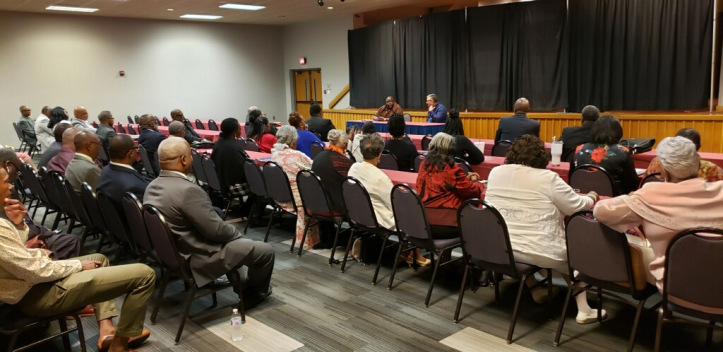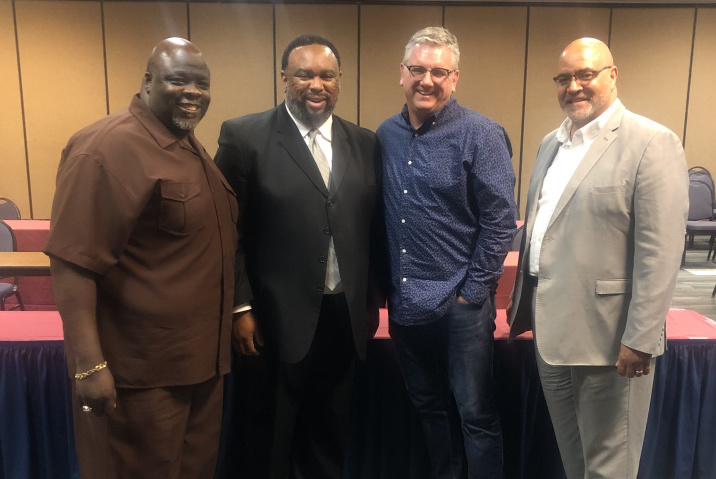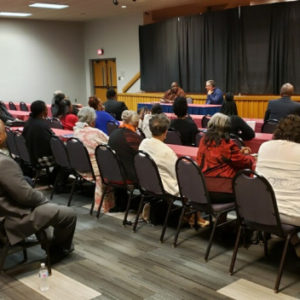
Pastor T.D. Hicks and myself talking to a room full of leaders at a breakout session at The Missionary Baptist State Convention of Kansas.
A couple of days ago (Tuesday, June 11th), Pastor TD Hicks and I sat in a room with pastors and leaders in The Missionary Baptist State Convention of Kansas. The topic was how a predominantly black church (Antioch Missionary Baptist Church) and a predominantly white church (Western Hills Church) were working together to minister to their city and bring healing to race relationships in the city.
Maybe it goes without saying, but I was the only white guy in room. A fact that TD quickly pointed out.
TD: Pastor Grant, I’m so glad you’re here, because now you finally know how I feel when I hang out with you!
The room exploded with laughter. The mood was set.
TD and I gave an overview of the story so far – the men’s breakfasts, the retreat, swapping pulpits, teaching through the Jonah series together as well as some future plans we have about adopting schools together. We both gave quick testimonies, but then it was time for questions and answers from the audience.
I really wish we had recorded the session. It was full of healthy back-and-forth questions. The conference room for the next hour and a half became a safe place to explore this issue with frankness and candor but most importantly – respect and honor. What follows are the highlights… as best as I can remember them.
How has each of your congregations responded to all of this? Positive? Negative?
TD: I went to Western Hills. Was a little nervous but felt welcomed. I was preaching and preaching hard, but there was nothing, no feedback. So I finally just told them… If I don’t hear you, then I think you’re not listening so I’ll just preach longer and louder. We’ll be hear all day.
Amazing. There were a ton of amens and preach its after that. Grant told me – hey man, they don’t do that for me. I was like – maybe it’s the preacher?
Seriously, what I loved about Western Hills was the willingness to go there. Grant came up after the message – right there in church – and said… Okay, TD. If we were at Antioch, how would you end the service and this message.
Fortunately for me, my son was there so we got him on the keyboards and went after it. It was great. Western Hills went there too. They were into it.
GE: I will say we’ve had a lot more ‘Amens,’ ‘Come ons,’ and ‘Preach its’ since TD.
TD: Now don’t let this man fool you, though. Grant came to Antioch, and one of my guys got up in the middle of his message and said – “This white boy can preach!” Church went nuts. It’s been fun and good.
GE: We’ve both seen movement in the hearts of our people. People who would have never thought they were privileged now can see that their friend of a different color has had a harder road to walk simply because they are black. We’ve had people realize that just because a person is white doesn’t mean they are out to stick it to the black man. For some of our people, this is the first time they’ve sat across a table to eat with a black or a white person. There’s an openness for more. There’s a desire and leaning in from our congregations to go deeper and further.
What makes this journey different than just a ‘Kum-ba-yah’ moment that really doesn’t effect change?
TD: This is one of the things that we both wanted to avoid from the outset. To only do a pulpit swap seemed shallow given the decay of race relationships in our culture. Sunday morning is still the most segregated hour of the day. So we purposed to do a couple of things very different.
First was to do all that we could to get whites and blacks around tables to build relationships. This starts with us and our leaders. It meant a lot of coffees and lunches. It meant having meetings where our staffs could start learning from each other. It’s why we started the men’s breakfasts on the first Saturday. It’s why we went on the retreat with Western Hills. It’s why we are teaching through the same series right now so that our congregants can go worship at the other place and still be a part of the same series. And it’s Jonah. A book that deals with matters of racism and nationalism head on.
We’ve got other things in the works but ultimately it is about RELATIONSHIPS.
GE: It must include actually hands-on ministry. So we went took our men on a retreat together —
TD: Yeah, let’s talk about that. You drove a bunch of black men… into the backwoods… of Salina… in the dark… on a road lined with trees. [Room starts laughing]
GE: The reason it was dark was because you were late… [More laughter]
The relationships being formed have to be the foundation for further ministry together. If all of this doesn’t result in adopting a school or working together for the Kingdom in some way – it would be fair to ask, what is the point.
Pastor Grant, we’ve heard about TD’s experience at Western Hills. What was your experience like at Antioch?
GE: It was like going down a long road…with trees… dark. [laughter]
TD: You want to explain what you mean by ‘dark’? [lots of laughter]
GE: Yeah… No… See, I told you I needed a safe place.
GE: It was warm. Inviting. I’ve never been hugged so much by grandmothers in my life. Still happens to this day – I’ll be somewhere, and if I’m not paying attention, there is some older black woman grabbing my neck and telling me how good it is see me and how’s my family. It’s been awesome.
There seem to be two intriguing issues here. One of collaborative ministry – which is rare on its own merit – and the issue of race on top of that. You two are obviously finding a way to navigate this. Why doesn’t this happen more?
GE: Speaking primarily about the race issue, I think – particularly in our culture in Topeka – if you had to pick one word to describe the white culture in West Topeka, you’d have to use the word – IGNORANT. By and large, the community that lives on the west side of town, never leaves the west side of town and is completely oblivious to the trials and troubles of those who live just a few miles away.
Now some of that may be willful ignorance. Some of it isn’t. For us, the biggest obstacle that I think we are dealing with is – I don’t know what I don’t know. So I need a safe place to ask dumb questions and not be labeled a racist for asking them. The atmosphere is so charged right now. The worst thing in the world is to be called a racist when in reality – I’m not. I’m just ignorant. I need to learn. I need to understand. I need a safe place where I can ask questions AND be lovingly called out on some presumptions that I may have that may not be true.
TD: I’d say using that same framework, the single word to describe East side is MISTRUST. We’ve heard all the promises. We’ve been lied to in the past, just another round of it. I learned that the Highland Park area was promised sidewalks when they were annexed into the city back in the ‘60’s or ‘70’s. No sidewalks appeared. To this day. So there is a lot of mistrust – some of it earned. So for us, I’d say that it isn’t just white people who can be racist. We’ve got to learn to let some things go and understand not every white person is out to get us.
TD spoke at length about the issue of churches relating to each other on equal footing. He spoke about not going to the table with a hand out but with something to bring to the table. For him, this was why it was so important for Antioch to host and pay for the breakfasts at first. This was something that I (Grant) just didn’t understand at the outset. But for the black church, TD said it was vital for their own development and growth to bring something to the table. It can’t just be the white church coming in to be the hero. The two must have equal footing.
Pastor Grant, you said this has provided a safe place to learn. Are you saying that is what most white pastors and congregations need?
GE: Um…. no. I don’t think I feel comfortable guessing where most white pastors are at on this issue. I doubt there is a single reason, either. I think some leaders are just flat out racist. They’re pretty sophisticated about their racism. They can hide it with well-worded excuses and analytics. But… there are probably a few that don’t want change.
But I know of many that care about this, and they are scared. Scared of being called a racist, asking a dumb question, not knowing what to do, making an innocent mistake. And it’s a huge relief to have a safe place to explore and learn.
I also think there are some who are carrying massive amounts of shame. Shame is a MAJOR obstacle. I think about my grandfather and great-uncle. In the KKK, on the hoses in Birmingham – I’m not proud about that at all. That’s not how I want to be judged and evaluated – by their racist behavior. However, this is how sin works, right? If we can keep sin in the dark and away from the light of Jesus – it can just grow and fester. I think we’ve got to bring it to the light. Let Jesus deal with it. Then – we’ve got to move forward. Easier said than done, I know.
Let me say one more thing about this… I think we’ve got both white and black leaders who just like the way things are, no need to go rocking the boat.
Here’s where I’m at on that – that’s fine. I don’t have time for you anymore. I hope God changes your heart. But I’m done wasting time trying to convince you. It’s now time to start doing something. And if that offends you, if that is not what you want – God bless you and leave me alone while I try to do something that matters. I know who I am and what God is calling me to do.
So what does this look like in regards to your city? When the next – and history tells us there will be a next – unarmed black kid gets shot? What does this relationship look like then?
TD: The untold truth of Ferguson was there were a community of pastors that already had a relationship with each other. And while they may not have been able to prevent the violence, they were able to rise up and lead the community to some healing, together. Our leaders visited there with the leaders of Ferguson and have started to put some things in place.
We’ve actually had a couple of issues come up in Topeka. We’ve had a shooting and a beating. Grant was the first white pastor in the community who called me and reached out. He asked – what do you need? I asked him – can you come with us to meet with the chief of police and other city leaders? And he did.
It was tense, but it was good. Grant was able to speak bluntly to both sides of table. There was some respectful but candid dialogue. In our case, the city made some promises to hire an independent person to review body cam footage of the police department from now on, a promise they are keeping. In fact, it’s happening this week.
GE: This whole thing started with the question “Could Ferguson happen in our city?” And for many people, they didn’t think it could ever happen. So there’s been a wake-up call of sorts – not to everyone. Right now this looks like not going to the table alone.
At the end of the day, I think there is a growing awareness that we – all – black, white, other – are dads, moms, husbands, wives, and grandparents that want to leave this place better than how we found it. We want to follow Jesus as best we can. That’s the legacy we both should want – and that’s not dependent upon the tone of my skin.
Are you planning to expand this to include other pastors into this experience?
TD: Yes. Sort of. Possibly. Here’s the thing, this is still new to us. We’re still trying to figure things out. We’ve had some hard conversations. We’ve had some sit down in a room together and lock the door until we can figure this out. And the reason we can do that is because of the relationship that Grant and I have.
If something doesn’t work or if something is awkward, we can and have said to one another – “Hey, Doc – this ain’t working.” Grant can say things to me that – honestly – no one else could get away with. And vice versa. We trust each other. We’ve had our families around the table with each other, our kids and wives know each other and can tease each other. How do you put that in a box? It’s impossible to put this in a curriculum or program and hand over to another church.
GE: I…. well…. To be blunt… If a pastor isn’t ready to develop an intentional, equal, and transparent relationship with another pastor who is of a different color than they are, then they aren’t ready for something like this.
This is… I think Pastor White’s word is true – INTENTIONAL. TD and I are dear friends. If this thing completely failed and fizzled out, we’d still grab lunch and talk Broncos football. And family. And faith. But this relationship didn’t just happen. We were intentional about it, and look at what’s happened.
This is not plug-and-play. It’s a lifestyle change. I mean we’ve both stood up in our churches and told our folks – go check out that other church. And they are doing it! We had about 20-25 of our folks go over there. They’ve had quite a few of theirs come over to Western Hills. How many guys are going to do that?
FINAL OBSERVATIONS

From left to right: Pastors T.D. Hicks, Ricky E. Bragg, Grant English, and Delmar White
There were other questions and healthy conversations after the session concluded. I felt like it was the start of a conversation we will need to revisit. It was noted by multiple leaders that this was different than just a pulpit-swap. This was decidedly more intentional and relational than that.
I am very thankful for both Pastor Ricky E. Bragg of Abundant Life Church in Kansas City and Pastor Delmar White of New Mt. Zion Baptist Church of Topeka. Pastor Bragg moderated the discussion, adding key insights for us that were timely and wise. Pastor White has been on the front lines of race relationships for a long time in our city. He’s got over 25 years experience of pastoral leadership as well as being a grief counselor with Midland Hospice. Both men were incredibly gracious to me, and I’m looking forward to learning more and more from both of these men.
I left the meeting very proud of both of our churches – Antioch Missionary Baptist Church and Western Hills Church. The only reason TD and I got this opportunity is because our congregations were willing to take the risk to reach across the city. And we are still in the middle of the story – with many chapters left to write.
But both of our churches have men and women who deeply love Jesus and want to see what is next in this crazy journey of following Him. And as a pastor, that’s all you ever ask for. Just give Jesus a chance to show off.

